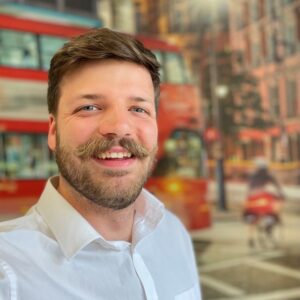
Role: Graduate Engineer (Utilities Technical Coordinator)
Career Area: Engineering Design
Current Study Level: SYSTRA’s Graduate Development Programme
Location: Reading
My role at SYSTRA
As a graduate at SYSTRA you are empowered to take responsibility from day one. In my role that means coordinating the design of utilities (gas, electric, telecom and fresh/foul water) that cross HS2 and ensuring our design teams take them into account.
I work with CAD professionals in both São Paulo (Brazil) and Ahmedabad (India) to produce designs and distribute them within our design joint venture. I also work with other disciplines across the UK, and the world, to assess the impact of their designs on utilities and ensure our colleagues are safe on-site.
I am also a member of SYSTRA’S Next Generation Leadership Team (NGLT), bringing my perspective as an early careers colleague into the company’s management structure, and hopefully providing some useful feedback. Working with the 11 other NGLT members from across various business areas is massively inspiring – it’s hugely rewarding to be able to have an impact on how we adopt and adapt our systems to AI and modern methods of construction. We also get involved in workshops and graduate recruitment.
My graduate programme decision
While studying for my Masters in Civil Engineering, I worked part-time for SYSTRA on the Transpennine Route Upgrade. I definitely feel at home at SYSTRA and there is a huge community of very talented engineers for me to learn from. SYSTRA’s stance on the light, conventional and high speed rail markets very much align with my own feeling on the sustainable transport solutions we need in a low-carbon future.
With over 10,000 colleagues worldwide, SYSTRA is large enough to support my chartership and provides the opportunities for me to move between disciplines (and countries). This is hugely advantageous in terms of gaining a wide range of experience. A huge effort is made by the company to ensure colleagues are engaged with both the NGLT and the Everyone Onboard diversity group – there is ample opportunity there if you’re willing to take it.
We asked Morgan…
How have your technical skills developed throughout SYSTRA’s graduate programme?
Before my involvement in the rail industry, I had absolutely no comprehension of the depth of infrastructure projects and the level of coordination required to tread the impossibly narrow path between technical and regulatory, as well as the constraints of public opinion. My current role as a Graduate Engineer (Utilities Technical Coordinator) has given me an insight into how the constraints of different disciplines can interact, and the challenges engineers face resolving these issues.
How have you grown personally since embarking on a graduate programme?
My work personality tends to be quite chaotic at times, but SYSTRA has taught me a lot about how to manage my time and workload more effectively to ensure I am getting the best outcomes.
What advice would you offer to someone who’s unsure if a graduate programme is right for them?
Whatever pathway into engineering you choose, whether it is a graduate programme or you go straight into a more developed position, it is most important you find a company that is willing to support you to develop your skills and harness your potential. Graduate pathways go some way to guaranteeing that, but you should make sure you find a job in an area you’re passionate about – it’ll make it easier to stay motivated throughout the dull bits and engaged when it gets exciting.
How does SYSTRA stand out as a great place to work?
The flexibility to work from the office or from home is a massive advantage. SYSTRA has given me the opportunity to travel across the country, and with so many office locations in the UK and Ireland, you’re always near one.
What’s your favourite thing about your job right now?
It’s really interesting to work with colleagues from across the world to create our design solutions. It is a fantastic experience to see how different ways of training influences individual approaches to problems and the eventual outcomes.
Diversity is powerful. What unique perspective do you offer as a graduate at SYSTRA?
Apart from my ‘iconic’ moustache, I bring my passion for engineering and the confidence to engage in conversation and problem solve at whatever level is required.
What would an entirely green future look like? How should our industry contribute?
I would argue that there cannot be an entirely green future, as there will always be trade-offs, and so this wouldn’t be sustainable. However, we do need to move past the stage where sustainability is a bolt on. As engineers, sustainability is an ethic and should be as fundamental to design as safety is. We need to be upfront about the challenges we face as an industry, and that every decision we make has a sustainability impact for better and worse, usually both simultaneously. We are currently consuming our infrastructure faster than we can build, repair and replace it. Previously routine processes associated with concrete construction are out-dated, and as engineers, we need to promote greener methods when working with our communities. Modal shift is essential to that transition. We need to find a way to convince people that our mass transit systems are fit for the future and the use of them is seen as a good choice rather than just a necessity.
You can spend your lunchbreak with anyone you admire – who would you choose?
The early settlement of Chicago sat at between 0.3 to 0.9m above the level of lake Michigan. This caused a huge problem because sewage would remain stagnant in the settlement sitting in the sandy soil below the city and infect the shallow wells, which drew water from only 2m below ground level. Ellis S. Chesbrough solved this problem by building sewers at the original ground level and raising the entire city around them (using hand jacks). He also built several underwater tunnels and reversed the flow of the Chicago River to protect the lake. I find the scale and imagination involved in these solutions inspiring, so a lunch with him would definitely be interesting.
What is your next big career goal?
Chartership is the next big goal in my career, and I am looking forward to the challenge of attaining it.
What excites you about your career future?
I am loving my involvement with the NGLT and the fantastic projects we are engaged in that make SYSTRA an even better place to work, which in turn helps us consistently perform for our clients. There are huge challenges facing the civil engineering, infrastructure and construction industries at the moment, but I’m excited about the innovation this will catalyse to make our cities better, more sustainable places to live.


 Australia
Australia  Brazil
Brazil  Canada
Canada  Chile
Chile  China
China  Columbia
Columbia  Denmark
Denmark  Egypt
Egypt  France
France  India
India  Indonesia
Indonesia  Ireland
Ireland  Italy
Italy  Malaysia
Malaysia  New Zealand
New Zealand  Norway
Norway  Panama
Panama  Peru
Peru  Poland
Poland  Portugal
Portugal  Saudi Arabia
Saudi Arabia  Singapore
Singapore  South Korea
South Korea  Spain
Spain  Sweden
Sweden  Taiwan
Taiwan  Thailand
Thailand  Türkiye
Türkiye  United States
United States  Vietnam
Vietnam